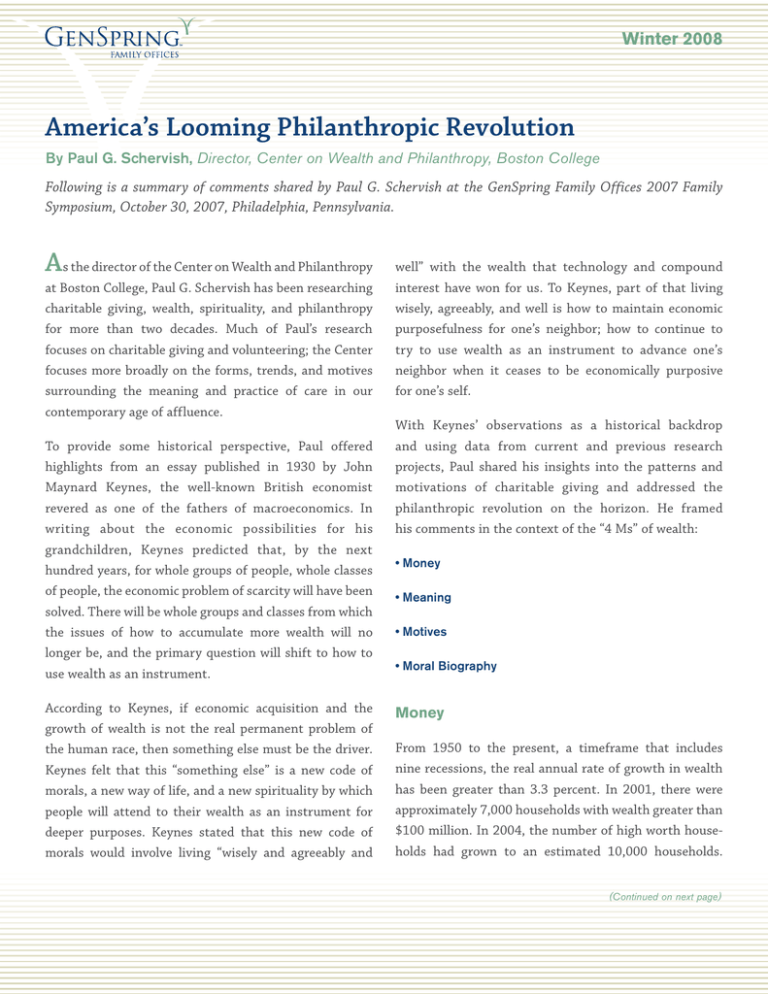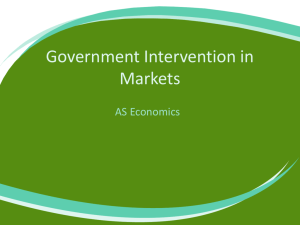
Winter 2008
America’s Looming Philanthropic Revolution
By Paul G. Schervish, Director, Center on Wealth and Philanthropy, Boston College
Following is a summary of comments shared by Paul G. Schervish at the GenSpring Family Offices 2007 Family
Symposium, October 30, 2007, Philadelphia, Pennsylvania.
As the director of the Center on Wealth and Philanthropy
at Boston College, Paul G. Schervish has been researching
charitable giving, wealth, spirituality, and philanthropy
for more than two decades. Much of Paul’s research
focuses on charitable giving and volunteering; the Center
focuses more broadly on the forms, trends, and motives
surrounding the meaning and practice of care in our
contemporary age of affluence.
To provide some historical perspective, Paul offered
highlights from an essay published in 1930 by John
Maynard Keynes, the well-known British economist
revered as one of the fathers of macroeconomics. In
writing about the economic possibilities for his
grandchildren, Keynes predicted that, by the next
hundred years, for whole groups of people, whole classes
of people, the economic problem of scarcity will have been
solved. There will be whole groups and classes from which
the issues of how to accumulate more wealth will no
longer be, and the primary question will shift to how to
use wealth as an instrument.
According to Keynes, if economic acquisition and the
growth of wealth is not the real permanent problem of
the human race, then something else must be the driver.
Keynes felt that this “something else” is a new code of
morals, a new way of life, and a new spirituality by which
people will attend to their wealth as an instrument for
deeper purposes. Keynes stated that this new code of
morals would involve living “wisely and agreeably and
well” with the wealth that technology and compound
interest have won for us. To Keynes, part of that living
wisely, agreeably, and well is how to maintain economic
purposefulness for one’s neighbor; how to continue to
try to use wealth as an instrument to advance one’s
neighbor when it ceases to be economically purposive
for one’s self.
With Keynes’ observations as a historical backdrop
and using data from current and previous research
projects, Paul shared his insights into the patterns and
motivations of charitable giving and addressed the
philanthropic revolution on the horizon. He framed
his comments in the context of the “4 Ms” of wealth:
•Money
•Meaning
•Motives
•Moral Biography
Money
From 1950 to the present, a timeframe that includes
nine recessions, the real annual rate of growth in wealth
has been greater than 3.3 percent. In 2001, there were
approximately 7,000 households with wealth greater than
$100 million. In 2004, the number of high worth households had grown to an estimated 10,000 households.
(Continued on next page)
(Continued from previous page)
There are now close to 11,000 households with net worth
in excess of 100 million. There are 115,000 households
with a net worth greater than $25 million.1 What once
belonged to an isolated class of industrialists, lords, and
nobles now belongs to whole groups and classes of people
as a result of earnings and inheritances.
Paul suggested that this exponential growth of wealth
has created the need for a new code of morals that has yet
to be discovered but is necessary to ensure that current
and future generations live wisely, agreeably, and well in
conjunction with wealth.
From Paul’s perspective, establishing an understanding
of the meaning of giving, one’s motives for giving,
and how one’s moral biography influences their giving
provides a pathway to greater meaning and fulfillment for
wealthy families.
Meaning
According to Paul, there is an ever-increasing emphasis
on the unity of life, the ability to create a world of joy and
comfort in harmony with our fellow human beings and
the planet we inhabit. This sense of unity, of belonging
to and making better the world in which we live, gives
meaning to our philanthropic efforts. As an example,
Paul referenced the meaning of the name of the city of
Philadelphia. Literally translated, Philadelphia means
“the city of” and “brotherly love.” Compare this with the
term philanthropy, which we translate to mean “the love
of human kind.” What happened to the brotherly aspect?
Paul asserts that “philea,” the root of philanthropy is a
special form of love: what Aristotle refers to as friendship
love of mutual nourishment.
To rebut the notion that formal philanthropy may not be
the greatest thing one can do in life, Paul suggested that
we look at philanthropic activity prior to the introduction
of tax deductions. After all, tax-deductible contributions
to an IRS-defined nonprofit sector have been in existence
for barely a half-century. What was the good that people
were doing with their lives before there was so much
wealth? What were people doing with their lives before
they became wealth holders? Was any of that activity less
meaningful because there was no financial benefit?
We were raised in an era where there was a sense that
wealth was limited. It wasn’t growing. The wealth that
somebody had was necessarily exploited from somebody
else. In terms of giving, it was a distributional ethic rather
than a productive ethic.
From Paul’s perspective, however, a change has arisen
over the last fifty years. We are now concerned about
social issues and their systemic causes. We are aware of
the financial costs of attending to the problems, and we
have the resources to address them. More importantly,
we have the will to focus on these issues, and we are
eliminating the technical and organizational roadblocks
that have stood in our way in the past. For the first time in
history, we are at the point where we can create material
solutions for the great needs on our planet.
1 Center on Wealth and Philanthropy at Boston College, with John J. Havens. “New Findings and Trends on the Relationship of Wealth and Income, and Philanthropy.”
Presentation to the 2006 annual meeting of the Association for Research on Nonprofit Organizations and Voluntary Action. Chicago. November 16, 2006.
As a direct result of this heightened awareness,
philanthropy today is no longer simply distributional.
The benefits of philanthropy in today’s society work to
produce a new way of living, a new code of morals, and
a new reality of world community never before seen in
history. This represents a more fundamental, deeper
vocation than simple charitable giving. We are finally in
a position to help create a civilization that thrives and
makes the most of living.
In order for ultra high net worth individuals and families
to experience the deeper meaning of philanthropic giving,
their charitable actions must have meaning. Paul shared
that, for us to truly appreciate the greater meaning of
giving, we must first understand our true motives for giving and how our moral biography influences that giving.
Motives
Our reasons for philanthropic giving are varied. Paul
referred back to the Latin movere (to move) and said
that motives are the mobilizing factors (desires, etc.)
that incline people to act.
But what gives meaning to motives for philanthropic
giving? Most of us want to “make a difference” or work
toward resolving issues that have personally impacted us
or affected us in some way. Paul linked this motivation to
the Aristotelian dictum, “avoid evil and do good.” But Paul
pointed out that we are still trying to figure out what this
actually means in terms of living wisely, agreeably, and
well. Paul asked the blunt question: What is the spirituality of mass affluence and mass wealth?
To help us begin to answer this question, Paul related
the importance of understanding the true meaning of
financial security. He defined financial security as having
enough wealth to provide the desired standard of living
for yourselves and your heirs indefinitely, despite any
major downturns in the economy that may occur.
Once we have solved the economic question for ourselves
and our heirs, something changes. We have the fullest
freedom possible to do what we want in terms of our
giving. Our motives can be pure, as we are no longer
motivated by tax deductions or external perceptions. We
can now examine how we will use wealth as a tool to find
a deeper purpose rather than acquiring more wealth or
living a more luxurious lifestyle. Paul asserted that
we cannot go unencumbered through this explorative
process to uncover our true motives for charitable giving.
Moral Biography
Paul shared that motives are closely aligned to an individual’s moral biography. But what is a moral biography? Simply put, it is a combination of capacity, moral
compass (see figure 1), and moral purpose. Our capacities
are the areas where we exhibit great talent and aptitude.
For example, your capacity could be in managing wealth,
intellectual capacity, personality, or individual talent.
Your daughter’s capacity, by comparison, could be her
(Continued on next page)
(Continued from previous page)
professional connections. The important fact is that all
of our capacities are latent. They are not active until we
make them so through purpose, value, ideal, aspiration,
and desire. In terms of wealth, a moral biography is one in
which there is exceptional capacity in the financial realm.
Figure 1: Moral Compass
MORAL BIOGRAPHY
Something kicks in once we have gone through the
psychological process of figuring out what we truly want
for others. As we figure this out, we are also determining
our moral biography of wealth, which will help us resolve
once and for all how to live wisely, agreeable and well,
both now and for future generations. As we begin to figure
out what we truly want for others, we in turn figure out
what we truly desire for ourselves.
The discovery of our moral biography will result in other
realms of spiritual nourishment in addition to formal
philanthropy. Formal philanthropy is just one expression
of our financial moral biography.
MOTIVES
MONEY
MEANING
To fully embrace our moral biography of wealth, we must
have an exceptional understanding of self, our aspirations, our purposes, and our duties. These are the factors
that will help us discover our true, unrestricted philanthropic motives. To Paul, this represents the fundamental
question of moral biography for the very wealthy. What
happens to our aspirations when we are unburdened from
financial security and tax concerns? As Paul said, we are
finally in a position to act. Now we have to figure out,
from a moral perspective, how to do it.
In closing, Paul reiterated that exploring our motives and
moral biography represents the first step in answering
the question of how we will use wealth to obtain a deeper
purpose of life. As Aristotle said, those we approach with
“philea,” the friendship and love of mutual nourishment,
these people represent another self. They are ourselves
in another body. We are on the verge of truly living that
experience. This is the new physics of philanthropy, but
it’s also the new physics of wealth counseling. Perhaps
most importantly, though, it is the new physics of wealth
and spirituality that you are discovering every day. The
best news of all is that each step you take brings you
closer and closer to reaching the ultimate goal of, as
Keynes said, “living wisely and agreeably and well.”
www.GenSpring.com
Printed on recycled paper. Sustaining resources for future generations. © 2008 GenSpring Family Offices, LLC. All rights reserved.








